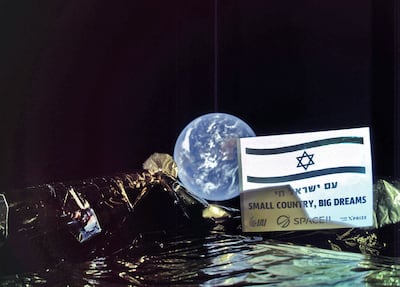The UAE and Israel have agreed to work together on two space missions, including Israel’s second attempt at a lunar landing.
An agreement was signed between the UAE Space Agency and the Israel Agency at Expo 2020 Dubai on Wednesday.
As part of the co-operation, the UAE will develop scientific instruments and exchange research for Israel’s Beresheet 2 lunar landing mission.
Minister of State for Advanced Technology
“Sharing knowledge and expertise is a key part of the UAE’s vision to create an attractive and competitive national space industry,” said Sarah Al Amiri, Minister of State for Advanced Technology and chairwoman of the UAE Space Agency.
“If you look at the most successful global space programmes in history, the common denominator is collaboration.
“Israel has a globally recognised space industry and developing bilateral and multilateral partnerships has never been so important as we embrace a new era of space exploration.”
Israel’s first attempt at a lunar landing in 2019 failed after the spacecraft crash-landed on the surface.
The new spacecraft, which includes an orbiter and two landers, is scheduled for launch in 2024.
The two countries will also co-operate on the Israeli-French Venus environmental satellite, which was launched in 2017.
Vegetation and environmental data gathered by the microsatellite will be shared with the UAE.
Universities in Israel and the UAE will also launch collaborative research projects. They include exploring the red tide phenomenon and analysing red palm weevil infestation, which threatens date palm cultivation.

Orit Farkash-Hacohen, Israel’s Minister of Innovation, Science and Technology, said the agreement represents peace between the two nations.
“Today on behalf of the government of Israel, I am pleased to sign a series of agreements for co-operation with the UAE Space Agency in important and groundbreaking fields,” she said.
“I thank the Minister of Advanced Technologies Sarah Al Amiri for the significant, collaborative work done in the last year between the two agencies.
“Thanks to this work we are already launching advanced initiatives for the benefit of our children's education and joint research.
“I share Minister Al Amiri's vision of harnessing science and space, not only as an economic stimulus but also for bringing hearts together and educating our next generation.”
The two countries normalised relations in 2020 as part of the Abraham Accords and have since signed more than 60 major agreements, at government and private sector levels.
The agreements cover industries such as science and technology, artificial intelligence, tourism, logistics, transportation, health care and energy.
Israel’s space programme dates back to 1988, when it launched Ofek-1 using its domestically built Shavit launch vehicle.
The country’s first and only astronaut IIan Ramon died during his first trip to space in 2003. He was one of the seven astronauts aboard Nasa’s space shuttle Columbia that broke apart during re-entry, leaving no survivors.
The UAE is hoping to land its Rashid rover on the lunar surface next year, using a lander built by private Japanese company iSpace. The mission would launch on a SpaceX Falcon 9 rocket from Florida’s Kennedy Space Centre.
Hazza Al Mansouri became the first Emirati man in space in 2019 when he boarded a Russian Soyuz rocket for an eight-day trip on the International Space Station.
Since then, the country has successfully placed a spacecraft around Mars and has announced an ambitious asteroid belt mission to explore seven space rocks, followed by an asteroid-landing attempt. The mission also includes a Venus fly-by.

